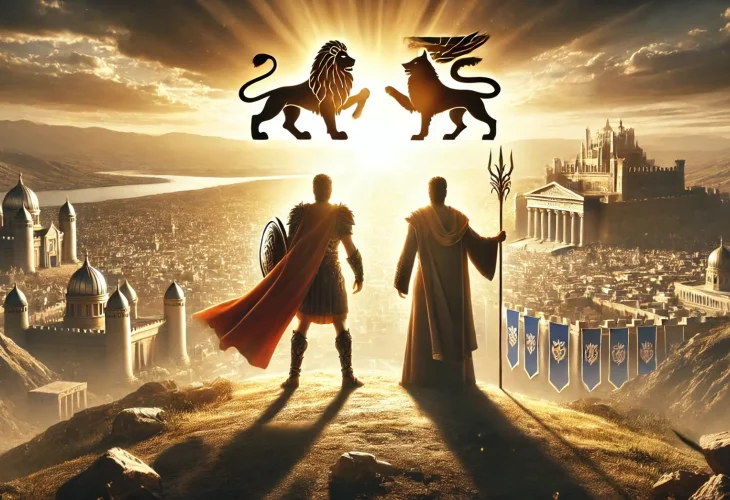Issues in the Bible
The Prophecy of Jacob’s Two Camps: The Hidden Roots of Israel’s Redemption
How Jacob’s two camps became the blueprint for Israel’s future — uniting the spiritual legacy of Leah and Rachel into a balance of holiness, resilience, and the promise of final redemption

When Yaakov Avinu (the Patriarch Jacob) approached the Land of Israel and heard that Eisav was coming toward him with an army, he divided his family into two camps. At that moment, a remarkable expression of gratitude burst forth from his heart: “I am unworthy of all the kindness and all the truth that You have shown Your servant, for with my staff I crossed this Jordan, and now I have become two camps.”
What moved Yaakov so deeply? Why did the act of dividing his family in two inspire such gratitude? After all, from a practical standpoint, dividing a family of eleven children into two groups is not particularly meaningful.
Yaakov, however, saw something far greater. He understood that this division was not merely logistical, but it was symbolic, and even prophetic. It carried deep significance for the future of the Jewish people.
As he looked at his sons preparing for the encounter with Eisav, Yaakov saw something extraordinary. He saw Yehuda, brave and strong, positioning himself to leap forward and protect his mother if danger struck. He saw Shimon and Levi whispering together, planning their counterattack should Eisav's camp dare to attack. On the other side, he saw Yosef stretching himself to shield his mother Rachel from harm.
Yaakov saw that his sons — though still young, were already forming themselves into distinct yet complementary groups, each with a different character and mission. And he saw the future.
The Two Forces That Sustain Israel
Above all, Yaakov saw the emergence of two great spiritual forces — the sons of Leah and the sons of Rachel, whose combined strengths would sustain and redeem the people of Israel throughout history.
True, the tension between them would later lead to the sale of Yosef, but even that tragedy became the very means of salvation during the years of famine. From Rachel’s children would come Yehoshua, who received the Torah from Moshe and led Israel into the Land; Shaul, the first king, from the tribe of Binyamin, who prepared the nation for redemption by waging war against Amalek and sacrificing himself for the sanctity of the land.
From Leah’s children would come David, who subdued Israel’s enemies and established the eternal kingdom.
Throughout Jewish history, this same pattern repeats:
Eliyahu HaNavi (Elijah the Prophet), who continues to accompany Israel in every generation, descended from the kingdom of Ephraim (Rachel’s line).
Yeshayahu HaNavi (Isaiah the Prophet), whose words comfort Israel through all exiles, came from the kingdom of Yehuda (Leah’s line).
Mordechai the Jew, who brought salvation in the story of Purim, was from the tribe of Binyamin (Rachel’s line).
Each camp — each spiritual current, fights evil in its own way. The sons of Rachel embody holiness, waging their battles through purity and spiritual steadfastness. Yosef rose to greatness in Egypt precisely because he refused to compromise his holiness, even for a moment. The sons of Leah embody strength, the power of repentance and resilience — the ability to fall and rise again, as seen in Yehuda’s confession, “She is more righteous than I.”
If Yosef had fallen, there would have been no recovery; his power lay in remaining pure. Yehuda’s power is the opposite — to sin, to stumble, and to return stronger. That is why, even though the northern kingdom of Israel (Yosef’s descendants) ultimately perished, the kingdom of Yehuda returned, rebuilt, and merited a second redemption and a return to the Land.
Unity of Holiness and Strength
The secret of Yehuda's enduring success lay in his alliance with Binyamin — Leah and Rachel united. The two camps Yaakov saw so clearly that night — the camp of holiness and the camp of strength, eventually joined forces in Jerusalem, where the Temple stood on the border between Yehuda and Binyamin.
Even when Yehuda was later exiled, the promise remained: she would one day return. Yet the final redemption will only arrive when both forces complete their missions and unite again, in love and peace, as Yaakov foresaw: Only when the children of Leah and the children of Rachel reunite, holiness and courage as one, will Israel be made whole under the kingship of Mashiach, son of David.

